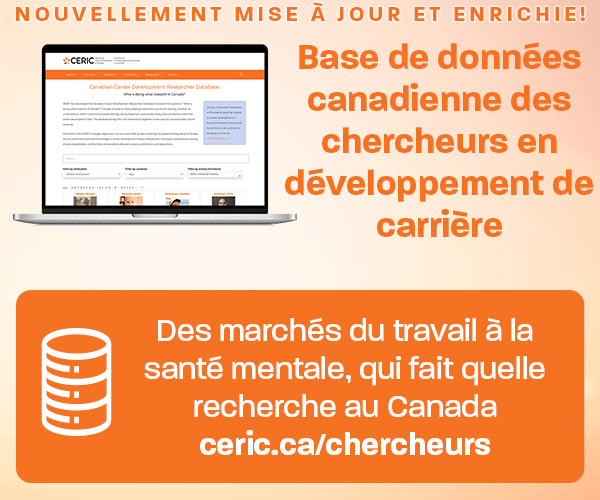Profilage du choix de carrière : le cas des techniciens en gestion des affaires des instituts techniques publics de la République de Trinité-et-Tobago, Antilles.
Mots-clés :
techniciens en gestion d'entreprise, instituts techniques, choix de carrière, Indes occidentales, marché du travailRésumé
This present paper delineates the characteristics of prospective individuals who wish to choose their careers by use of empirical evidence drawn from a comprehensive study of how Business Management Technicians (BMTs) from State-run Technical Institutes (SRTIs) in The Republic of Trinidad and Tobago, West Indies fared on the Labour Market. BMTs (500) from a population of 1170 were surveyed using semi-structured interviews, opinionnairs, academic records and a questionnaire to examine 11 key areas representing both worker and job characteristics. Females from five year high schools who opted for the business studies subject group at Cambridge General Certificate of Education (GCE) ordinary level or Caribbean Examinations Council (CXC) basic or general proficiency level examinations were found to be the most suitable candidates for prospective BMTs. On-thejob training experience appeared important and work in the business and other sectors especially for the 20-29, 40-49, > 49 age cohorts was found to be an asset. An instructive career profile
should address certain fundamental variables like resourcefulness, dedication, resilience, patience, management, personality orientation, critical thinking, assertive communication, divergent thinking, autonomy, independence, ethics, optimism, flexibility, planfulness, reliability, dependability, commitment to continuous learning, responsibility, high self esteem and selfefficacy, self-discipline and self -reliance.
Références
Adams, D. (1971). Education in national Development. London: Routledge and Kegan Paul.
Berg, I. (1973). Education and Jobs: The Great Training Robbery. London: Penguin Publishers Limited.
Blaug, M. (1970). An introduction to the Economics of Education. London: Penguin Books.
Blustein, D.L., Phillips, S.D., JobinDavis, K., Finkelberg, S.L. & Roarke, A.E. (1997). “A theorybuilding investigation of the school-to-work transition”. The Counseling Psychologist, 25, 364- 369.
Borgen, W.A. (2002). Introduction: Innovations in Career and Employment Counselling. The Canadian Journal of Counselling.34, 3. July 2002. http://cjc.icaap.org/jul00.html#6 June 06, 2005.
Career Fit-employment and career profiling services. www.careerfit.com.au/welcome.html. May 30, 2005.
Carnoy, M. & Levin, H.M. (1985). Schooling and work in the Democratic State. California: Stanford University Press.
Cohen, B. N. (2003). “Applying existential theory and intervention to career decision-making.” Journal of Career Development, 29 (3): 195- 209, Spring 2003.
Harbison, F. (1973). Human resources as the wealth of Nations. New York, NY: Oxford University Press.
Henderson, S. J. (2000) “Career Happiness: More Fundamental than Job Satisfaction.” Career Planning and Adult Development Journal 15, No. 4 (Winter 1999- 2000), 5-10.
Holland, J. L. (1997). Making vocational choices (3rd ed.). Odessa, FL: Psychological Assessment Resources.
John S. Donaldson Technical Institute (2005). Business Management Technician. Brochure.
Lauglo, J. and Lillis, K. (eds.), (1988). Vocationalizing Education: An International Perspective. Pergamon Comparative and International Education Series (6), London: Pergamon Press.
Lofquist, L. H. and Rene V. Dawis, R. V. (1984). Essentials of Person-Environment-Correspondence Counseling IN Psychological Theory of Work Adjustment: An Individual – Differences Model and Its Applications. USA: Minnesota University Press. http://www.upress.umn.edu/Books/L/lofquist_essentials.html, June 01,2005.
Magnusson, D. (1967). Test Theory. Massachusetts: Addison Wesley Publishing Company.
Neault, R. (2000). Career Management: The Role of Career Counsellors in Building Strategic Partnerships Between Individuals and their Employers. Canadian Journal of Counselling. 34, 3. July 2002. http://cjc.icaap.org/jul00.html#6 June 06, 2005.
Neault, R. (2002). “Thriving in the New Millennium: Career Management in the changing world of work”. The Canadian Journal of Career Development. 1, 1, 2002. OSU-Okmulgee Assessment Center Academic and Personnel Profiling Assessment (2002). http://www.osuokmulgee.edu/assessment.shtml. December 30, 2002.
Norusis, M.J. (2000-2005). The SPSS guide to Data Analysis for SPSS/PC. Chicago, IL, USA: SPSS Inc.
Pelsma, D. and Arnett, R. (2002).“Helping clients cope with change in the 21 st Century: A balancing act.” Journal of Career Development, 28 (3): 169-179, Spring 2002.
Penney, R.B and Cahill, M. (2002). “Effective Career Counseling: Relationship between Work Personality, Learning Style and Client Intervention Preferences”. The Canadian Journal of Career Development. Vol.1, No1, 2002.
San Fernando Technical Institute (2005). Business Management Technician. Brochure.
Scott, C. M. (2002). “Counseling adults in Career Transition: Reflections of a counselor-in-training.” Journal of Career Development, 28 (3): 215- 220, Spring 2002.
Stufflebeam, D.L. (2000). The CIPP model for evaluation. In D.L. Stufflebeam, G.F. Madaus, and T. Kellaghan, (Eds.), Evaluation Models (2nd ed.). (Chapter 16). Boston:
Kluwer Academic Publishers.
Trinidad and Tobago. (1990). Restructuring for Economic Independence: medium term macro planning framework, 1989-1995. Trinidad and Tobago: National Planning Commission.
Trinidad and Tobago (1986). Draft plan for educational Development in Trinidad and Tobago (1986-1990). Trinidad: Government Printery.
Trinidad and Tobago. Ministry of Labor, Employment and Manpower Resources Ministry of Education. (1990). National Consultation Working on Human Resources Development. Port of Spain : Ministry of Labor, Employment and Manpower Resources and Ministry of Education.
Trinidad and Tobago. Ministry of Education. Crown Agents. (1991). Optimizing Technical and Vocational Education and Training. Prefeasibility study prepared for the Ministry of Education/Ministry of Planning and Mobilization of Trinidad and Tobago. Trinidad: Crown Agents.
Trinidad and Tobago. Ministry of Education. Crown Agents. (1992). Prefeasibility Study of Technical Vocational Education and Training in Trinidad and Tobago. Vol. 1-
Presentation of Analysis Findings and Recommendations. Vol. 2- Appendices. Trinidad: Crown Agents.
Trinidad and Tobago. (1993). Job Evaluation/Classification Exercise. Port of Spain: Office of the Prime Minister.
Trinidad and Tobago. Ministry of Education. (1993). Dictionary of Occupations for Trinidad and Tobago. (DOTT). Port of Spain: Ministry of
Education.
Walsh, T. W. and Betz, N. (1985). Tests and Assessment. New Jersey; Prentice Hall Inc.

Téléchargements
Publié-e
Comment citer
Numéro
Rubrique
Licence

Cette œuvre est sous licence Creative Commons Attribution - Pas d'Utilisation Commerciale - Pas de Modification 4.0 International.











